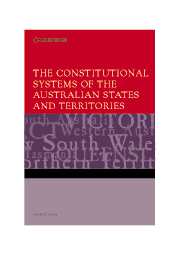Book contents
- Frontmatter
- Contents
- Table of cases
- Table of statutes
- Preface
- List of abbreviations
- Map
- 1 Introduction
- 2 Constitutional evolution of the States
- 3 The Legislature
- 4 Legislative power
- 5 Repugnancy
- 6 Manner and form
- 7 Extraterritoriality
- 8 Executive power
- 9 Republic
- 10 Judicial protection
- 11 Commonwealth territories power
- 12 Commonwealth territories
- Appendix 1 Constitutional Conventions adopted by Resolution of the Australian Constitutional Convention, Brisbane 29 July – 1 August 1985
- Appendix 2 Northern Territory (Self-Government) Regulations 1978 (Cth) – Reg 4
- Appendix 3 Australian Capital Territory (Self-Government) Act 1988 – Schedule 4
- Appendix 4 Ten Lessons from the Crisis over the Governor-General, Dr Peter Hollingworth (May 2003)
- Index
Appendix 1 - Constitutional Conventions adopted by Resolution of the Australian Constitutional Convention, Brisbane 29 July – 1 August 1985
Published online by Cambridge University Press: 16 November 2009
- Frontmatter
- Contents
- Table of cases
- Table of statutes
- Preface
- List of abbreviations
- Map
- 1 Introduction
- 2 Constitutional evolution of the States
- 3 The Legislature
- 4 Legislative power
- 5 Repugnancy
- 6 Manner and form
- 7 Extraterritoriality
- 8 Executive power
- 9 Republic
- 10 Judicial protection
- 11 Commonwealth territories power
- 12 Commonwealth territories
- Appendix 1 Constitutional Conventions adopted by Resolution of the Australian Constitutional Convention, Brisbane 29 July – 1 August 1985
- Appendix 2 Northern Territory (Self-Government) Regulations 1978 (Cth) – Reg 4
- Appendix 3 Australian Capital Territory (Self-Government) Act 1988 – Schedule 4
- Appendix 4 Ten Lessons from the Crisis over the Governor-General, Dr Peter Hollingworth (May 2003)
- Index
Summary
A. The basic principle is that the Ministry has the confidence of the House of Representatives.
B. Following a general election in which the Government is defeated, the Governor-General, having taken the advice of the outgoing Prime Minister as to the person who the outgoing Prime Minister believes can form a Ministry that has the confidence of the House of Representatives, appoints as Prime Minister the person who, in his opinion, can form a Ministry that has the confidence of the House of Representatives.
C. If the Prime Minister resigns, the Governor-General, having taken the advice of the resigning Prime Minister as to the person who the Prime Minister believes can form a Ministry that has the confidence of the House of Representatives, appoints as Prime Minister the person who, in his opinion, can form a Ministry that has the confidence of the House of Representatives.
D. If the Prime Minister dies in office, the Governor-General, having taken the advice of the next most senior Minister as to the person who that Minister believes can form a Ministry that has the confidence of the House of Representatives, appoints as Prime Minister the person who in his opinion can form such a Ministry.
E. If following a defeat in the House of Representatives, the Prime Minister, acting in accordance with Practice F, advises the Governor-General to dissolve the House of Representatives or to send for the person who the Prime Minister believes can form a Ministry that has the confidence of the House of Representatives, the Governor-General acts on the advice.
[…]
- Type
- Chapter
- Information
- Publisher: Cambridge University PressPrint publication year: 2006



